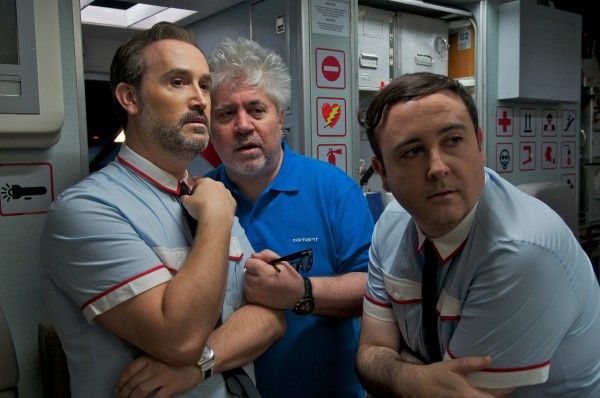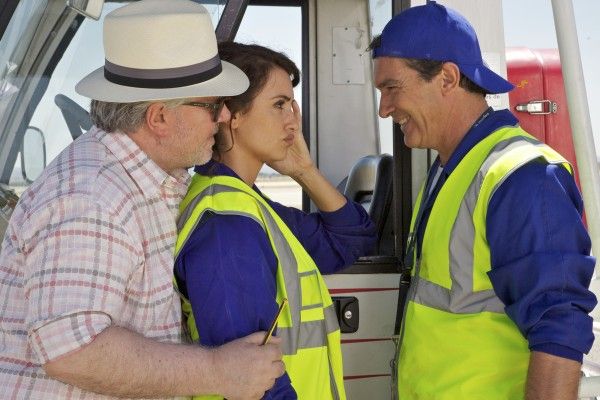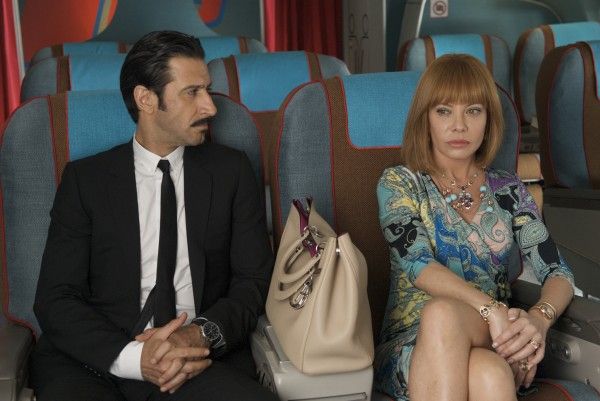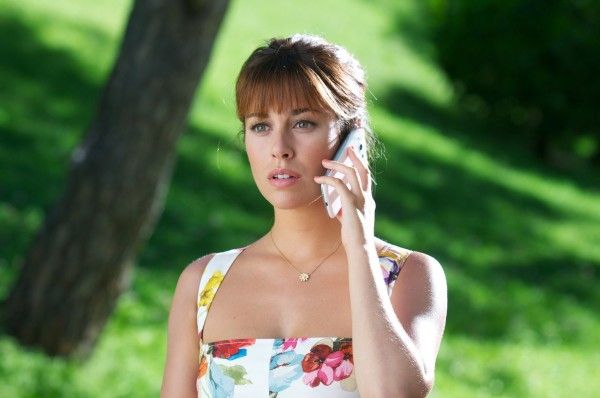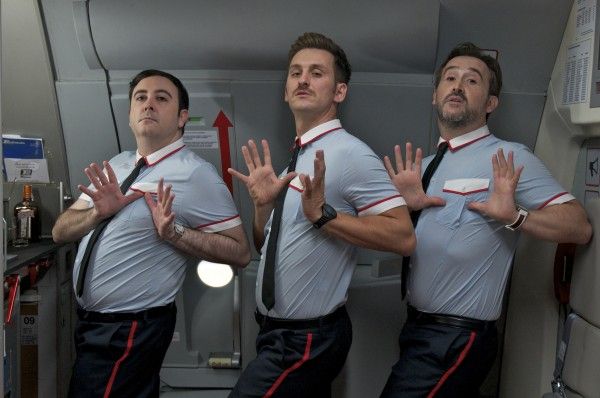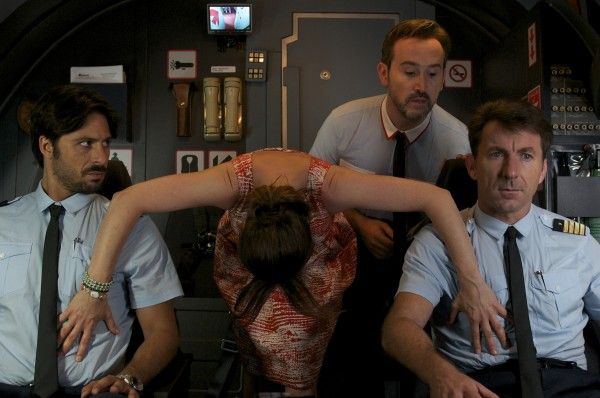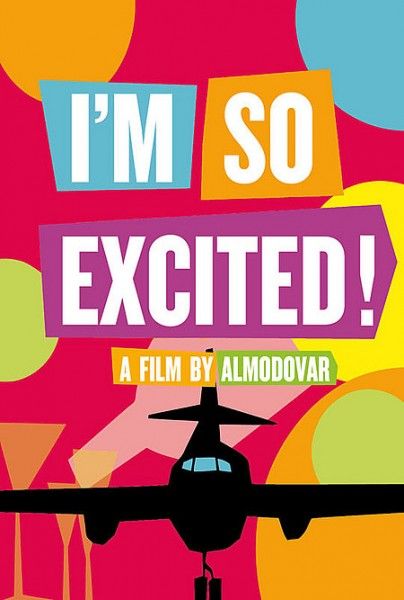Pedro Almodóvar’s hilarious new comedy, I’m So Excited, takes flying to new heights as his flamboyant characters embark on an unusual journey fueled by alcohol, sexual desire and the fear of imminent death. From take-off until emergency landing, fate weaves an unpredictable thread linking the passengers with other characters, and the plane’s tiny galley and cockpit become the settings for some of the movie’s funniest scenes. Opening June 28th, the film features cameos by Penélope Cruz and Antonio Banderas and an ensemble cast that includes Javier Cámara, Antonio de la Torre, Hugo Silva, Miguel Ángel Silvestre, Carlos Areces, Raúl Arévalo, José María Yazpik, Guillermo Toledo, Cecilia Roth, Lola Dueñas, Paz Vega and Blanca Suárez.
At the film’s recent press day, Almodóvar talked about the role that sex and death play in his work, how the song that inspired the title became the full-scale choreographed centerpiece of the movie, why he likes to write while flying, how this movie fits into his larger body of work, and why it may be the gayest film he’s made in 20 years. He also discussed four new scripts in progress, why he shouldn’t be compared to Luis Buñuel, and the summer films he’s looking forward to seeing. Hit the jump for the full interview.
Question: The title is inspired by The Pointer Sisters’ song. When did you decide that you wanted to use this song as the film’s choreographed centerpiece? Were there others songs you considered?
Pedro Almodóvar: Since the very beginning, when I was writing the script, I knew I wanted that for these flight stewards. For me, they were these three characters that are usually in musicals. They are the three masters of ceremonies. Also, they have a lot of rites and rituals. When they come onboard the plane, everything they read and do is exactly the same every day, although what is happening in the movie is not exactly what currently happens inside a plane. Of course, they do everything to entertain the passengers. I just thought about the choreography of one song, and I was very excited and felt very good about it for many reasons. On the one hand, it’s an iconic disco song. They are very queenie, as you saw. They like this type of song very much. Also, it is a song that has not been used too much in movies because there are many. Of course, I didn’t think about putting in I Will Survive. That’s also something from the same time, but it’s been used too much. Also, I’m So Excited is a very good title in English, because in English, you don’t have the double meaning that “passengers” has in Spanish, Italian and French, as far as I know. In Spanish, a passenger is someone that travels and something that is fleeting, and their two meanings are important. Also, in Spanish, “excited” or “exitado,” is, like here, something that implies someone is infused with excitement, but it also implies sexual arousal. And that was the mood of the passengers and the flight stewards in the second half of the movie.
Sex and death seem to be themes that frequent your movies going back to Matador and, of course, here. Can you define them in the context of your work?
Almodóvar: I think both sex and death are eternal themes. You could make thousands of movies on this theme, and whether you have a human being who is painting, singing, making a film, writing, these are the themes that you will come back to and return to. If you don’t have any of these artistic expressions, sex is one of the only gifts that nature gave you for free, so it is very important to celebrate it. And then, with death, we are condemned to that. This is absolutely present in our lives. I tried to think about these two issues very freely. With sex, I think I can manage with that. With death, this is a more difficult theme for me. I’m not a believer, even though I’m baptized. I don’t practice. I don’t believe in God, so I feel very alone facing death. When I made Matador, I tried to discover myself dealing with this theme. What I discovered is that the only way to recognize death is if you are part of life, if you are part of sexual pleasure, if you link it with sexual pleasure. But I feel like a child. In my first two movies, there was no killing. It was in the fourth movie, What Have I Done to Deserve This? Of course, you haven’t [done anything]. Death is there, everywhere. I cannot understand why this cycle is like it is.
At the beginning of this film, Penélope Cruz and Antonio Banderas appear in a cameo. You’ve worked with them many times. What is your favorite thing about them as actors and as people? Have they changed since you first met them?
Almodóvar: They have changed in the sense that Penélope started off as a 19-year-old and is now 39. She has a son, and in a few days, she will have a baby girl. She’s a mother. She has a husband. As a woman, she obviously has changed as she has become an adult. But, as an actress, I actually might say that she has not changed that much. And she has something great, especially in comedy, and she hasn’t been exploited as much as she could be in comedy, but particularly in that mix between comedy and drama. She’s got a very special quality about her. You can place her in very extreme situations, especially very painful situations, in terms of how her character interprets it. And sometimes, the deeper and more human that pain is, the better she is at it. Fortunately, she continues to be a gorgeous woman, and the camera loves her, and I do, too. Antonio, of course, started with me, and the kinds of characters that he played, that we did together in the 80’s, were these very crazy characters mostly determined by their passion. And so, unlike my Penélope, once Antonio came to the United States and started making movies here in the States, he also moved to the States, formed a family here in the States, and in some ways became an American actor and a very successful American actor, whereas Penélope has always kept a foot in Spain and Europe. She has continued to make European films. In their relationship with me, they have not changed. They are exactly the same people since the first time that I met them. It’s the same with Antonio. When we are together, he reacts to everything in the same way that he did 30 years ago when we first started. So they became important for me in both senses. They are two actors that I am very familiar with. I have the advantage of having had very good results with their work, but also they belong to my emotional family.
Where did the idea for this film come from? Were you on a plane when you got the idea or have you had an experience on a plane where you were concerned about what was happening?
Almodóvar: I have to fly a lot, more than I want to. But I’m a very dull passenger. I don’t speak. I don’t have sex. No alcohol. I don’t do drugs. The thing that I like about flying is that I feel like I can really concentrate. I used to write many things, and many ideas for my movies belong to this moment where I’m not anywhere specifically in terms of time and space and geography. I am suspended, and this suspension fits me very well. I enjoy very much writing and reading on the plane. The first pages that I wrote were about a father that wants to speak with his daughter and wants to say goodbye without saying goodbye to all the women of his life, but he doesn’t dare to explain the situation, and that was more dramatic than comedic. This character disappeared, and when I decided to make a comedy, he became this financier that is very corrupt, and of course, he wants to talk with his daughter. Immediately after I wrote that, those pages gave me the will to make a comedy and also the tone of the comedy. I started writing a lot of sequences that are very spontaneous and crazy which happen in the cockpit. They were so funny that I kept on writing. Sometimes I write something, but it’s not for one specific script. I do it for pleasure and for refreshment. For this kind of refreshment, I wrote several sequences that happen in the galley, and they were very funny, but they were not one story. They were not characters. My brother, who is the first person who usually reads everything that I write, laughed and said, “Why don’t you just keep on writing. If you make a comedy, it will be very welcome in Spain and Europe and in our production company.” The thing about it was I needed to build a number of new characters and to find a situation, because a comedy shouldn’t be something that’s simply joke after joke after joke. When I finished the first draft of the script, I didn’t like it. I found that I pushed many things to be funny, and so I kept it in my desk. It was years later when I read it again, and then I knew exactly why I didn’t like it. Then I took it with new ideas, and it was the background of the Spanish economic crisis that gave me something that could act like a metaphor underneath it. So that’s how it came about. In the beginning, I didn’t know what I was going to tell. I didn’t know the story. I didn’t even know if that page was going to be part of one script. I like to write and I write every day. I always say it’s a good practice.
At any point, do you stop and reflect on where your latest movie fits into your larger body of work or how it departs from films that you’ve done in the past?
Almodóvar: All the films that you make, whether you realize it or not, are part of a chain, and they’re all linked together in one way or another. I am conscious that this is almost the opposite movie of The Skin I Live In or Broken Embraces or Volver, but I identified very much with it. I mean, it belongs more to the decade of the 80’s when I started making movies, and also when I think I wanted to recover my youth or recover that kind of explosion of freedom that we experimented with in Spain and in Madrid after Franco died and the new democracy arrived. For me, at the end of the shooting, then I realized that it was a tribute that I had made to that decade of the 80’s, not to my career, but to the decade of the 80’s in Spain. Spain has changed a lot, for worse, for much worse now. The whole world has changed, and also I’m 33 years older than I was in the 80’s. I missed that atmosphere that we lived in, in Madrid of the early 80’s.
Many actors want to work with you. Is there anyone you’re itching to work with? Or, when you write a part, do you prefer to discover the actor who’s right for the role?
Almodóvar: When I’m writing, I don’t put faces on the characters. When I finish the first draft of the script, I start visualizing, and sometimes then I think about one actor. For example, in this one, since the beginning, I thought about Javier Cámara for the role of Ricardo, the head flight attendant. For example, with Antonio, who I’ve worked with six times, there was only one time that I thought about him, and it was during the writing of Tie Me Up! Tie Me Down! Or Carmen Maura, who I made six movies with too in the 80’s, the only time that I thought about her since the beginning was Women on the Verge of a Nervous Breakdown. When I finish, I like to find an actor that I’ve worked with in the past who fits well with the character I’ve written. I always like to work with actors that I know. But, at the same time, it is very exciting for me to experiment with new actors and sometimes with people that have not been actors before. This is a mix of both things.
All of your films have this aspect of being a moving painting and they’re very visual. I’m curious from the point of writing the script to designing the film, how do you work with your design team to achieve that specificity visually?
Almodóvar: I’m really a nightmare for the fashion designer because I take away all of his authority, and I become the authority, and I turn him into my assistant. You could say I intervene, and I intervene in a very determining way in all the aspects that have to do with the visual construction of the film. This doesn’t really happen at the end of my first draft of the script, but once we actually have the production script after many rewrites, at that point is when I start to decide what the look and colors will be. I work like a painter, even though I’m working in three dimensions. I’m working with chairs. I’m working with walls. But even things like the floor or the walls that people might think are not important, they actually do influence the visual look of the film. These are also things that I have to think about.
You had gay characters in your films long before anyone else thought to do it, and you’ve also had a queer sensibility even in films that didn’t have gay characters. But this film, with its campy musical numbers, seems to be the gayest film you’ve done in 20 years. Is there a reason for that?
Almodóvar: Yes, I’m conscious of that. As you know, in my movies, this is not the first time that there are gay characters, but I didn’t ask the actors to make anything more effeminate or flamboyant. Also, to be gay is something very normal. I mean, of course there exists flamboyant gays, but I was more interested in the story. For me, whether they’re sexual or bi-sexual or transsexual or homosexual, it was not a big deal. In this specific film, I think this is part of the genre, and that for one comedy I deliberately, consciously wanted it to have very queeny gay people because it was much more fun. Also, it’s something that’s related to the rules of theater. I saw them as masters of ceremonies in a theater play, and then for them to be as flamboyant as they are, I got the feeling that it was perfect for the story. So that’s why. It’s funny because they are not gay, and they had to offer me different versions of being very effeminate. It was difficult because I didn’t like many of them. They offered me an example, “You want us to be like someone in the night?” They know “in the night” in Madrid. And I said, “No, no, no, no. Not that type.” They were looking for someone just to imitate, and I was with them. That was at the same time very funny and a lot of work for them, and so was the choreography. They are very generous actors. They were rehearsing because, of course, they don’t dance and they should. They were rehearsing for a month and a half.
This is a relatively light comedy. Are you concerned that the critics might think that Almodóvar has gone light when it comes to filmmaking?
Almodóvar: No. I’m not concerned about that. I’m almost sure that they’re going to say something like that, that this is a minor work, because comedy is usually treated in that way. My dream is that people go to see it, and my concern is more about will they may have to read a lot just to understand the movie, or will they be able to enjoy it and watch the faces and the subtitles at the same time, because this is a very aural movie. I would like to invite audiences to see the movie a second and a third time. It’s not just to make a bigger box office, but the movie is more enjoyable the second or third time. My concern is just if this is a joyful and entertaining movie for the American audience, for an audience that is not very aware or concerned about the Spanish society or the social problems that are now in my country, because, of course, the movie can also be seen like a metaphor of that. I would like for the American audience to see the movie without knowing anything about Spain. For the press, we had a lot of screenings. With an audience, we had two screenings in New York. They were very successful. It seems to me that they got exactly what I wanted. And for me, this is my concern. For example, in Spain, I didn’t read the reviews for my last three movies, and I live much better without that.
Have you begun thinking about bonus material or maybe a director’s commentary to explain some of the things an American audience might not get?
Almodóvar: I’m not exactly sure yet. We do have a few short pieces that deal with either the way in which I direct the actors or that reveal certain kinds of situations that happened during the shooting, but they will be the same in Spain as they will be here.
Do you think this movie has a message?
Almodóvar: Specifically, when I sit down to write, I don’t think about a message that I want to write. But, of course, there is a point of view about reality and about many things that perhaps are not in the first reading, but they are behind the story. What I think is generated by my movies is I give to my characters a lot of freedom – I mean a moral autonomy. So that’s very important. This is also something very political. It doesn’t matter if it’s a horror movie, a comedy, a science fiction, a drama or a melodrama. For me, it feels like the characters are the owners of their decisions. This is very important for me. In this movie, there is a metaphor about the Spanish society. You don’t need to see that, but it is there. That fear and uncertainty are both feelings that I experience in my country, and I feel it represents the Spanish society. We are frightened of what is happening. We need an emergency landing. We also are traveling in a circle without knowing exactly what will happen or where we will find the right place to land. This is not a message, but it’s like I’m living in a place like that. As I said before, it is not necessary that the American audience will see this metaphor.
Once the promotion is over and you get back to Spain, what movies this summer are you looking forward to watching?
Almodóvar: I would like to see some movies that were not part of the official selection in Cannes. For example, I’m dying to see La Vida de Adela. Here it’s Blue Is the Warmest Color. I also would like to see the second movie of the director [Sean Durkin] of Martha Marcy May Marlene. I don’t know if it’s finished, but I think he’s finishing one. I also want to see La Grande Bellezza. It’s supposed to be in Madrid soon. It’s an Italian movie directed by Paolo Sorrentino. Also, I’m dying to see The Past from Asghar Farhadi, the same director of A Separation. And the American movies, there’s one that I wanted to see that recently opened. It was not After Earth. This is a very simple movie, but I’m not going to see it. Yes, The East. And also, I don’t know if we’ll go to it in Madrid, but Into the Void. It’s an Israeli movie. I’m not sure, but I’m curious about What Maisie Knew. I don’t know how the movie is, but I read the Henry James novel and I’m a big, big, big fan and admirer of him. And also, I’ll see the new movie of [Nicolas Winding] Refn that’s called Only God Forgives. But not After Earth.
There have been some comparisons between your career and Luis Buñuel’s and some comparisons of this movie to The Exterminating Angel. What’s your take on that?
Almodóvar: I don’t want you to compare it with The Exterminating Angel or me with Buñuel because I’m not Luis Buñuel. But it’s true. It’s not exactly what I was writing, but by chance I saw The Exterminating Angel again, and I said, “Oh my God.” It’s incredible to see this kind of masterpiece again and again. I thought, “I’m working on a story that has things in common with that.” It happens in one unique place, where people cannot go out. It was much more interesting in Buñuel because they go out and they don’t know why. In my movie, there is less genius. They don’t [go out] because they’re on a plane. Also, I was nervous, but not sad, because that always surprises me when I discover something that I see in someone else’s movie. For example, in both movies, there is a virgin. In Buñuel’s movie, it’s the character played by Silvia Pinal. It was an unbelievable virgin because she was too spectacular and very desirable, and also I knew that at that moment she was the wife of the producer, but anyway, a virgin. And also, in my movie, there was someone more believable, not so gorgeous. But it’s true, and there’s also some realistic level in the movie, because you don’t try to justify that. They are there like that. Buñuel and I belong to the same culture, so I mean we belong to the same family. But I don’t want to be compared with him because I think he is one of the unique geniuses of the last century. I’m not, and I’m not going to be in the rest of my life.
Can you talk about what you have coming up next? What are you writing now and what do you plan to direct in the future?
Almodóvar: I’m not sure now. Of course, I’m writing, and I have more than one project in my desk, but I don’t know. I need to finish the promotion of this film. This week will be the end, and then I’ll go back to Madrid. I hope that in two weeks I will know. I have four scripts in different stages of development, but there are two that are at the head of the pack. I have two frontrunners. I will decide among these two. I need for it to be much quieter, because even though I wrote a little during the promotion, since January, I have not been in Madrid for more than a week or 10 days. It is always like that, like coitus interruptus.
I’m So Excited opens this weekend.


